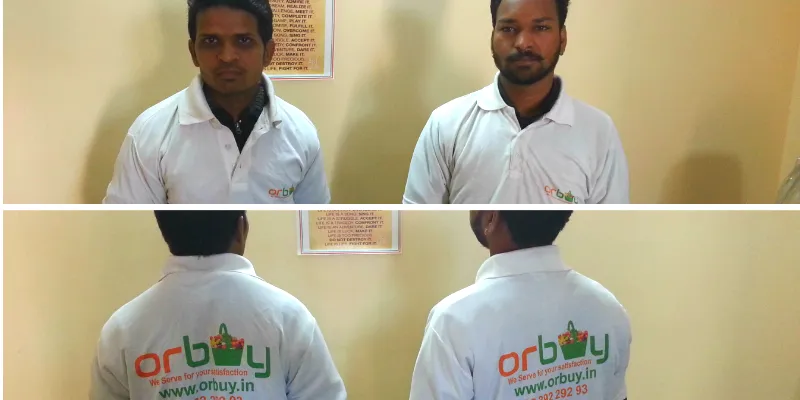Ordering your groceries can be as easy as jabbering on WhatsApp or giving missed calls with Orbuy, a Jaipur-based startup
The slot machine that is the concept of hyperlocal grocery delivery in India flashed triple 7s to its consumers almost immediately after being introduced. But suggesting that its operations and logistics function like clockwork would be saying too much too soon. This is true for tier 2 and 3 cities. The specifications that might be conducive for a savvier and more affluent consumer class in tier 1 cities may not necessarily pander to the needs of a consumer from a smaller city. Everything from your system language, to the products and prices, to how complicated the process of punching an order is, might be a deal-breaker for your clients. The key to hyperlocal is juxtaposing your mainstream B-plan with the unique local flavours of its areas of operation, which is what Aniruddh Sharma tries to achieve with Orbuy – a two-month-old Jaipur-based hyperlocal grocery delivery startup.
“Recently, I returned to my hometown Jaipur from one of the busiest cities in India – Mumbai. Back there, I was used to the comforts of calling up the local kirana store and having the groceries delivered at my doorstep. They charged an additional Rs. 20forhome delivery, but I considered it a cost to my convenience as I did not have to waste my time in traffic. In Jaipur, we looked for a similar arrangement, out of habits developed in Mumbai, and discovered that there were very few options here. That led us to our “problem statement” and we started looking for solutions for tier 2 cities like Jaipur,” says 30-year-old Anirudh, who, until that point of enlightenment, was a Derivatives Research and Trading professional with five years of undergoing the grind.

“We talked to potential customers and found all the gaping holes in the service delivery, pricing, and products of these stores – like very huge minimum order amount, etc.”
Apart from getting its fundamentals right by providing competitive prices and offers, and a large network of stores, Orbuy strives to make customer’s life easier by employing easyprocedures to browse and place orders. They are the only player in India, which has bilingual–that is English and their local tongue –language support, thus making it easily understandable to a large number of customers.
Taking into account the popularity of WhatsApp and people’s nimbleness with the messaging app, not to mention age-old phone antics like missed calls and text messages, Orbuy provides its customers options such as calling,missed calls, sendingWhatsApps, messages, as well as punching orders on their website, so they may order at ease. “Grocery shopping is not meant to be complicated, it must be as easy as going down to the corner shop. And aren’t advancements in technology and digitisation supposed to make life simpler?”
According to a study by advisory firm Technopak,the food and grocery industry in India is now worth $383 billionand is expected to touch $1 trillion by 2020.In this cut-throat market, the hyperlocal players can only hope to have an edge by battling it out on the grounds of offers, prices, quality, and service.
In thisregard, Orbuy is eyeing a fat piece of the pie through introducing a host of differentiators. The minimum order amount has been capped atRs. 200 for free delivery, which is lesser than other major players like PinkcityKirana, PepperTap, and Grofers – that happen to be their biggest competitors. Other larger players like ZopNow, Big Basket, LocalBanya have their eyes set on the Pink City, but are yet to enter the race. Another value offering, possibly to build goodwill, is providing free delivery services of medicines to senior citizen when an order is placed.
“We are also targeting institutional clients like restaurants, hotels, PGs, and hostels for bulk orders. Our deals will help them budget their month better and more cost-effectivelywhile bulk sales will also be good for us to get higher profit margins and consistency,” says Aniruddh, of their roadmap for expansion.

One of the most important differentiations is that they are not sourcing fruits and vegetables from the inventories of nearby vendors like Grofers and PepperTap do, but rather, getting them from actual farmers in and around the city.
Since starting out in October 2015, average revenues per month havebeenupwards of Rs.1.5 lakh, which comes from nearly 300–400 completed orders. Out of their current customer base, 70 per cent are recurring clients. “A very small but highly motivational milestone we have achieved is that we have matched our operating expenses from our sales in the first month of our operations,” shares Anirudh, proudly.
Currently bootstrapped, the company is looking for raising capital to bolster their expansionplans, wherein they are targeting tier2 and 3 cities of India. With concrete plans to hit the markets of Udaipur and Kota in early 2016, they hope to have a presence in at least 12 tier-2 cities of India by the end of 2016.
YourStory Take
With a modest local start yet unique local flavours, Orbuy shows promise. Entering an almost untapped market was a gap duly converted into an opportunity and furthermore, a profitable enterprise. But the hyperlocal market is getting more and more crowded by the minute. Orbuy is well-equipped for the oncoming storm with its distinct features like WhatsApp ordering and notification through missed calls, but that will only take them as far as a marginal edge. For going the distance, an exhaustive spread of products, competitive prices and meticulous service is the simple yet million-dollar-recipe, and that is where their focus must be. Building a pan-India presence should be a long term goal, but only after they strengthen their bastion in the fortuitously-virgin Jaipur.







